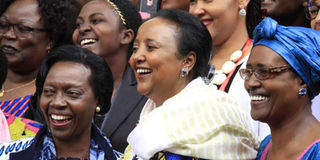Hatred among women hindering their leadership chances, Amina says

From left to right: Former Justice Minister Martha Karua, Foreign Affairs and International Trade CS Amina Mohamed and Oxfam International executive director Winnie Byanyima during the opening of the African Women Leaders Symposium (AWLS) at the Safari Park Hotel on August 24, 2016. PHOTO | DIANA NGILA | NATION MEDIA GROUP
What you need to know:
- In Kenya, despite a constitutional provision that a third of appointive and elective posts in government be of a different gender, the country has been unable to fulfill that condition. That is partly because fewer women have been contesting in elections, citing improper political environment for them.
- Ms Mohamed, the first woman to hold the foreign ministry docket in Kenya, argued women must also make individual contribution to change the status quo if at all the continent is to achieve the required gender balance.
Foreign Affairs Cabinet Secretary Amina Mohamed on Wednesday challenged women to “first accept each other” before demanding equality with men.
At an opening session of a women leadership forum in Nairobi, Ms Mohamed said “it is a shame” that women continue to hate one another even in times when their cooperation can help the cause of women.
“We must empower ourselves. We must first accept each other. We go through stages where we can't even trust women in leadership,” she argued.
“It is a shame that this continues to happen. We should all strive to be women of substance. We have to vote for women. Ask yourself, why should anybody else do for you what you do not want?” she posed.
She was speaking at African Women Leaders Symposium (AWLS) at the Safari Park Hotel in Nairobi.
In a continent with more than half of the population being women, there has only been three women presidents — in Liberia, Mauritius and Malawi.
The Foreign CS argued the current status of inequality between men and women in getting economic opportunities means there could be gender parity only by 2133 if nothing is done.
“I do not think there is anyone here who will be alive to see that but that means if we sit back and do nothing,” she said.
In Kenya, despite a constitutional provision that a third of appointive and elective posts in government be of a different gender, the country has been unable to fulfill that condition. That is partly because fewer women have been contesting in elections, citing improper political environment for them.
In fact Kenya, with only 19 per cent of legislators being women has missed two deadlines to pass that law.
Ms Mohamed argued such discrepancies can be helped if women first chose to elect female candidates.
“Half of the world’s population are women and the other half was born by women,” she told the audience.
Ms Mohamed, the first woman to hold the foreign ministry docket in Kenya, argued women must also make individual contribution to change the status quo if at all the continent is to achieve the required gender balance.
“I can tell you what I have done...is a drop in the ocean and I hope I could do more to support women,” she said referring to how she has hired more than half of staff as women in her ministry.
“We actually need to be in the driver's seat...That is why I wish I had a vote in the US to vote for that woman (Hillary Clinton),” she added.
She spoke to an audience that included former Justice Minister Martha Karua, Oxfam International Director Winnie Byanyima, Special Envoy for Gender and Vice President of African Development Bank Geraldine Fraser-Moleketi and constitutional lawyer Betty Murungi.
The forum was organised by UN Women and Oxfam.





